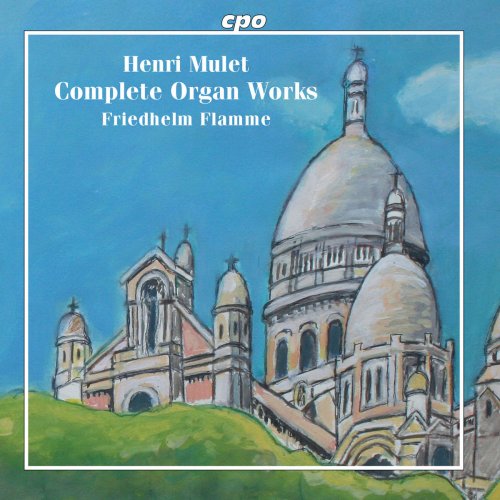
Friedhelm Flamme - Mulet: Complete Organ Works (2018)
BAND/ARTIST: Friedhelm Flamme
- Title: Mulet: Complete Organ Works
- Year Of Release: 2018
- Label: CPO
- Genre: Classical
- Quality: flac lossless +booklet
- Total Time: 01:27:54
- Total Size: 329 mb
- WebSite: Album Preview
Tracklist
---------
CD1
01. Esquisses byzantines: No. 1, Nef
02. Esquisses byzantines: No. 2, Vitrail
03. Esquisses byzantines: No. 3, Rosace
04. Esquisses byzantines: No. 4, Chapelle des morts
05. Esquisses byzantines: No. 5, Campanile
06. Esquisses byzantines: No. 6, Procession
07. Esquisses byzantines: No. 7, Chant funèbre
08. Esquisses byzantines: No. 8, Noël
09. Esquisses byzantines: No. 9, In Paradisum
10. Esquisses byzantines: No. 10, Tu es petra et portæ inferi non prævalebunt adversus te
CD2
01. Méditation religieuse
02. Angelus
03. Petit offertoire
04. Sortie douce
05. Prière
06. Offertoire funèbre
07. Offertoire pour la fête du très Saint Rosaire
08. Carillon-Sortie
Henri Mulet was born in the immediate vicinity of the Sacré-Coeur Basilica in 1878 and studied organ with Charles-Marie Widor and Louis Vierne at the Paris Conservatory. Vierne ranked his student with the “most brilliant of musical personalities” and described him as “an outstanding virtuoso and a very fine improviser.” From 1923 to 1931 Mulet was a professor at the Schola Cantorum in Paris; Camille-Saint-Saëns was one of his colleagues, and Gabriel Fauré merits mention as one of his first students. Mulet’s oeuvre focused first and foremost on the organ, and the Esquisses byzantines composed from 1914 to 1919 and published in 1920 has continued to be his most frequently performed collection of pieces. While the rhythms and meters in most of his pieces – the “quadrature of the compositional structure” castigated by Richard Wagner – were rather conventional, the harmonies negotiating between Debussy, Wagner, and Vierne are very appealing.
---------
CD1
01. Esquisses byzantines: No. 1, Nef
02. Esquisses byzantines: No. 2, Vitrail
03. Esquisses byzantines: No. 3, Rosace
04. Esquisses byzantines: No. 4, Chapelle des morts
05. Esquisses byzantines: No. 5, Campanile
06. Esquisses byzantines: No. 6, Procession
07. Esquisses byzantines: No. 7, Chant funèbre
08. Esquisses byzantines: No. 8, Noël
09. Esquisses byzantines: No. 9, In Paradisum
10. Esquisses byzantines: No. 10, Tu es petra et portæ inferi non prævalebunt adversus te
CD2
01. Méditation religieuse
02. Angelus
03. Petit offertoire
04. Sortie douce
05. Prière
06. Offertoire funèbre
07. Offertoire pour la fête du très Saint Rosaire
08. Carillon-Sortie
Henri Mulet was born in the immediate vicinity of the Sacré-Coeur Basilica in 1878 and studied organ with Charles-Marie Widor and Louis Vierne at the Paris Conservatory. Vierne ranked his student with the “most brilliant of musical personalities” and described him as “an outstanding virtuoso and a very fine improviser.” From 1923 to 1931 Mulet was a professor at the Schola Cantorum in Paris; Camille-Saint-Saëns was one of his colleagues, and Gabriel Fauré merits mention as one of his first students. Mulet’s oeuvre focused first and foremost on the organ, and the Esquisses byzantines composed from 1914 to 1919 and published in 1920 has continued to be his most frequently performed collection of pieces. While the rhythms and meters in most of his pieces – the “quadrature of the compositional structure” castigated by Richard Wagner – were rather conventional, the harmonies negotiating between Debussy, Wagner, and Vierne are very appealing.
Year 2018 | Classical | FLAC / APE
As a ISRA.CLOUD's PREMIUM member you will have the following benefits:
- Unlimited high speed downloads
- Download directly without waiting time
- Unlimited parallel downloads
- Support for download accelerators
- No advertising
- Resume broken downloads


